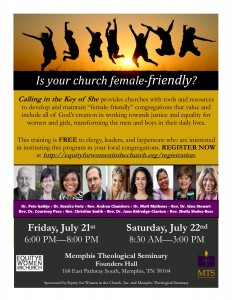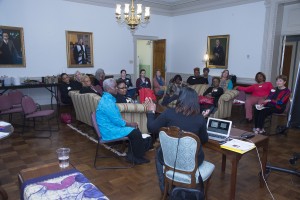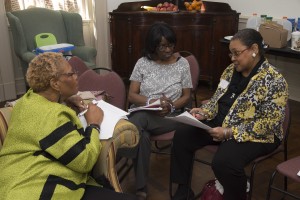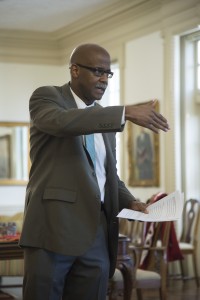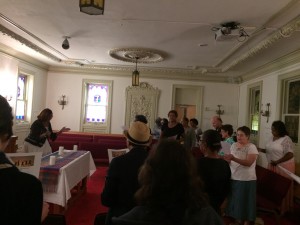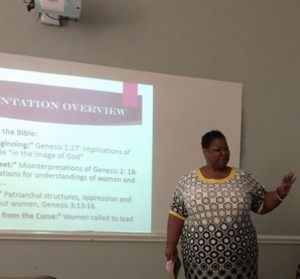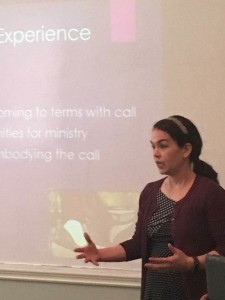Calling in the Key of She
 Calling in the Key of She is one of the projects of the national, multicultural, ecumenical Equity for Women in the Church Community. Calling in the Key of She is an empowerment program for clergy and religious leaders that seeks to address the gap of female leadership in Protestant churches by educating and empowering congregations to become more “female-friendly.” The project also includes programs to impact girls and boys at an early age by educating them, exposing them to female clergy and religious leaders, and allowing them to explore various aspects of ministry available to all persons.
Calling in the Key of She is one of the projects of the national, multicultural, ecumenical Equity for Women in the Church Community. Calling in the Key of She is an empowerment program for clergy and religious leaders that seeks to address the gap of female leadership in Protestant churches by educating and empowering congregations to become more “female-friendly.” The project also includes programs to impact girls and boys at an early age by educating them, exposing them to female clergy and religious leaders, and allowing them to explore various aspects of ministry available to all persons.
Equity for Women in the Church has held two Calling in the Key of She training programs, one in the spring at Perkins School of Theology and another this summer at Memphis Theological Seminary. Both these programs included powerful presentations and wisdom shared through storytelling in small groups. Below are some visual images and presentation content from these programs. Watch for more on my blog.

Both programs began with an overview presentation by Rev. Andrea Clark Chambers, Equity Board member who initiated and developed Calling in the Key of She. She defines “female-friendly” congregations as intentionally working “to create an inclusive environment,” based on the belief “that God equally loves, calls, values, and affirms the gifts of females as well as males.” Andrea laments the prevalent “one-sided model of ministry that primarily emphasizes male leadership, male gifts, male roles, and male talents.” Calling in the Key of She attempts to correct this distorted model by “re-envisioning God’s original intent given in Genesis 1 that female and male work together in fulfilling God’s plan for the world.” Andrea challenges participants to consider what difference it would make if:
- women and girls see themselves as active, vital participants in the life of the church;
- girls hear females in the Bible in a positive light;
- girls hear God’s name and it sounds like their own;
- women and girls feel equal and just as valued and affirmed as men and boys;
- women feel safe and welcomed in church;
- males believe that females must fully partner together with them to fulfill God’s kin-dom;
- women and girls know that they are called by God too.
Rev. Clark Chambers distributed a handout she created with practical ways for participants to work toward the Calling in the Key of She goal of creating “female-friendly” congregations. She encourages people to “bear courage,” and make a difference by making changes in language, visual imagery, and practice.
Language
- Uplift scriptures that are liberating, redemptive, and life-giving to women and other oppressed groups.
- Use gender inclusive language in church and society.
- Use various names for God (e.g. She, Spirit, Rock, Creator, Wisdom, Mother).
- Preach and teach about women as much as about men. Highlight positive aspects of women in the Bible and reinterpret texts that are used to subjugate women/girls.
- Place equal value on women’s and men’s voices and contributions in church and society.
- Compliment girls on more than their beauty and attitude. Look for ways to affirm and speak positively about women and girls.
- Have conversations that redefine and reimagine masculinity and femininity.
- Use female examples when talking about biblical topics and social issues.
- Don’t make sexist jokes and remarks or laugh at them.
- Refuse to participate in conversations where women and girls are not valued.
- Speak up and speak out against all forms of oppression, dominance, and violence against females and other oppressed groups.
Visual Imagery
- In rituals, services, and ceremonies, make sure to visually represent women/girls as well as men/boys.
- Place images in the church of women in the Bible as well as men.
- Display pictures of God that expand our ideas of God.
- Display images of women and girls as well as men who have made contributions to the church.
Practice
- Start preparing girls early for leadership, including ministry roles.
- Mentor girls and women so that they have access, resources, and the experiences they need to grow and develop into who God has called them to be.
- Appoint women to serve on boards and committees that are traditionally led by males.
- Invite women to preach in worship services not limited to “Women’s Day” and “Youth Sunday.”
- Include everyone in every facet of the life of the church. Subvert the norm: invite women and girls to cut the church lawn, move tables and chairs, take out the trash, preach to men and boys; invite men and boys to prepare meals, care for children, clean the church, go on field trips.
- Partner with other organizations working for women’s equality (e.g. Equity for Women in the Church, Christian Feminism Today, WomanPreach, Inc.).
- Celebrate Women’s History Month.
- Start a library that intentionally highlights the contributions of women in church and society and provides resources that combat sexism and other forms of oppression.
- Don’t place limitations on girls and boys through attitudes, behavior, toys, colors, etc., that severely limit their identity.
- Change bylaws and policies that limit women and girls in the church.
- Don’t refer to women only in relation to the men in their lives (wives, mothers, sisters, etc.).
- Have difficult conversations about oppression, violence, rape, and sexual harassment inside and outside the church.
- Become familiar with scriptures that uplift and encourage women. Read books/articles that expand your knowledge of issues of sexism and oppression.
Rev. Clark Chambers gives this challenge: “Support the full equality and value of women in your congregation and society. Affirm the value, worth, and call of women and girls. Use your power and righteous indignation to make a difference in the world. When you have a seat at the table, use your power to liberate and do justice for all oppressed people.”

